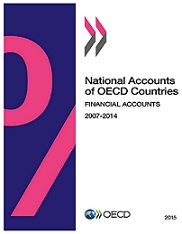Kozlowski, Julian, Veldkamp, Laura, Venkateswaran, Venky, (2016), “The tail that wags the economy: The origin of secular stagnation”, VoxEu, 11 Σεπτεμβρίου The Great Recession has had long-lasting effects on credit markets, employment, and output. This column combines a model with macroeconomic data to measure how the recession has changed beliefs about the possibility of future crises. According to the model, the estimated change in sentiment correlates with economic activity. A short-lived financial …Read More
What are the prerequisites for a euro-area fiscal capacity?
Demertzis, Maria, B. Wolff, Guntram, (2016), “What are the prerequisites for a euro-area fiscal capacity?”, Bruegel Policy Contribution Issue n˚14, 9 Σεπτεμβρίου A monetary union without fiscal union is generally considered to be incomplete. We consider three steps for increasing the centralisation of fiscal functions, and discuss the prerequisites for moving forward at each one. Above all, fiscal integration is a matter of trust, which is currently at a low …Read More
The ECB’s asset purchase programme: an early assessment
Andrade, Philippe, Breckenfelder, Johannes, De Fiore, Fiorella, Karadi, Peter, Tristani, Oreste, (2016), “The ECB’s asset purchase programme: an early assessment”, ECB Working Paper Series No 1956, 9 Σεπτεμβίου This paper analyses the effects of the European Central Bank’s expanded asset purchase programme (APP) on yields and on the macroeconomy, and sheds some light on its transmission channels. It shows, first, that the January 2015 announcement of the programme has significantly and persistently …Read More
Net debt supply shocks in the euro area and the implications for QE
S. Blattner, Tobias. A. S. Joyce, Michael, (2016), “Net debt supply shocks in the euro area and the implications for QE”, ECB Working Paper Series, 9 Σεπτεμβρίου This paper examines how shocks to the net supply of government bonds affect the euro area term structure of interest rates and the wider macroeconomy. To measure net debt supply we construct a new free-float measure, which adjusts total government debt of the four largest euro …Read More
What Makes a Good ʽBad Bankʼ? The Irish, Spanish and German Experience
Cas, Stephanie Medina , Peresa, Irena, (2016), “What Makes a Good ʽBad Bankʼ? The Irish, Spanish and German Experience”, European Commission, Discussion Paper 036, Σεπτέμβριος This paper examines the experience of three asset management companies (AMCs) or ʽbad banksʼ established in the euro area following the 2008 global financial crisis. Specifically, it studies NAMA, Sareb and FMS Wertmanagement (FMS). These AMCs were set up to purchase growing nonperforming loans on banks’ …Read More
Public investment stimulus in surplus countries and their Eurozone spillovers
Veld, Jan in ‘t, (2016), “Public investment stimulus in surplus countries and their Eurozone spillovers”, VoxeEU, 9 Σεπτεμβρίου The spillover effects of a fiscal stimulus in normal times are likely to be small, at best. This column argues, however, that when interest rates are stuck at the zero lower bound and monetary policy does not offset the expansion, public investment in surplus countries could have significant positive GDP spillovers to the …Read More
National Accounts of OECD Countries, Financial Accounts 2015
OECD, (2016), “National Accounts of OECD Countries, Financial Accounts 2015”, OECD Publishing, 2 Σεπτεμβρίου The National Accounts of OECD Countries, Financial Accounts includes financial transactions (both net acquisition of financial assets and net incurrence of liabilities), by institutional sector (non-financial corporations, financial corporations, general government, households and non-profit institutions serving households, total economy and rest of the world) and by financial operation. Country tables are expressed in national currency. Data …Read More
The Impact of Brexit on the EU Budget: A non-catastrophic event
Núñez Ferrer, Jorge, Rinaldi, David, (2016), “The Impact of Brexit on the EU Budget: A non-catastrophic event”, CEPS, 7 Σεπτεμβρίου Given that the UK is one of the largest economies in the Europe Union – with per capita income above the EU average and therefore a net contributor – there have been concerns that the country’s decision to leave the EU could strongly impact the EU budget. On closer scrutiny, however, this …Read More
Increases in the retirement age and labour demand for youth
Boeri, Tito, Garibaldi, Pietro, Moen, Espen (2016), “Increases in the retirement age and labour demand for youth”, VoxEU, 8 Σεπτεμβρίου The Eurozone’s sustained rise in youth unemployment since 2008 threatens to create a ‘lost generation’. This column presents evidence that this is, in part, an unintended consequence of pension reforms in southern Europe that locked in older workers. In future, reforms that create flexible retirement ages alongside variable pension levels …Read More
European banks under stress (tests): Which remain the most resilient?
De Groen, Willem Pieter, Gros, Daniel, (2016), “European banks under stress (tests): Which remain the most resilient?”, CEPS, 11 Αυγούστου The latest round of stress test conducted by the European Banking Authority for 51 large banking groups showed huge differences in the degree to which a shock, or so-called adverse scenario, would impact different banks. We find that banks with a high exposure to sovereign risk and especially those with many non-performing loans …Read More





